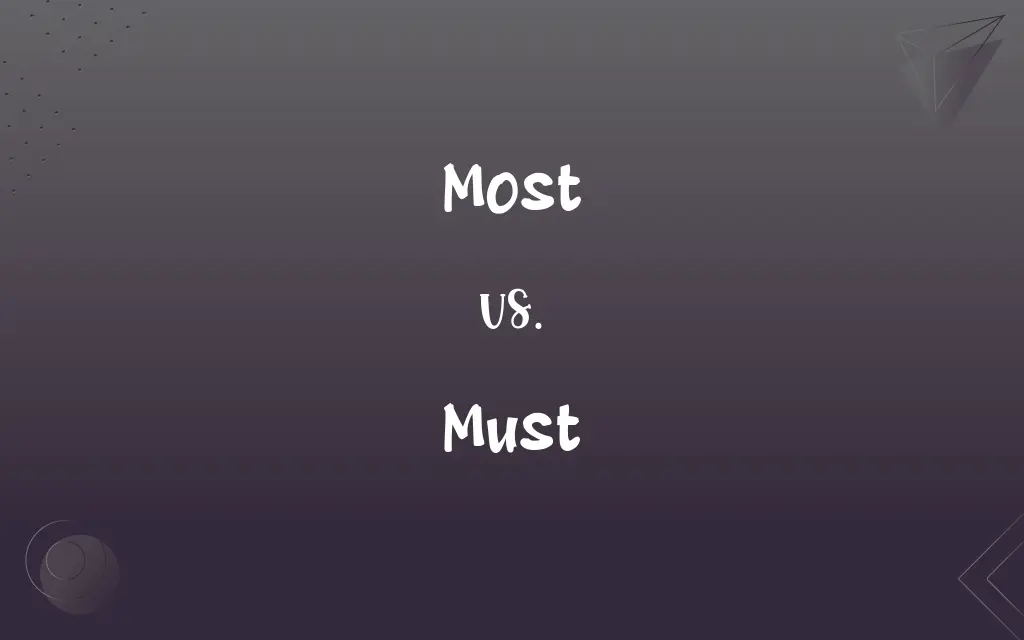Most vs. Must: What's the Difference?
Edited by Harlon Moss || By Janet White || Updated on October 3, 2023
"Most" denotes the superlative degree of quantity or degree, while "Must" indicates an obligation or necessity.

Key Differences
"Most" and "Must" are two words in the English language that serve entirely different grammatical functions and convey different meanings. "Most," primarily an adverb or adjective, denotes the superlative degree, often describing the highest amount, level, or degree of something. For instance, when comparing three or more things, we use "most" to highlight the one that stands out the most in terms of quantity or degree.
On the other hand, "Must" is a modal verb, indicating obligation, necessity, or a strong recommendation. It introduces the idea that something is essential or needs to be done. For example, "You must wear a helmet" signifies that wearing a helmet is compulsory or highly advised for safety reasons.
In usage, "Most" can modify nouns, pronouns, adjectives, or other adverbs. It is often seen in phrases like "most people," "most important," or "run the most quickly." "Must," meanwhile, is followed by a base verb to convey a sense of duty or requirement, as in "must go" or "must see."
To sum it up, while "Most" helps in quantifying or grading, "Must" introduces an element of obligation, recommendation, or necessity. Understanding the distinct roles these words play in sentences is vital for proper communication and comprehension.
Comparison Chart
Part of Speech
Adjective/Adverb
Modal verb
ADVERTISEMENT
Function
Denotes superlative degree
Indicates obligation or necessity
Examples
Most people, most delicious
Must go, must see
Usage with Verbs
Modifies verbs as an adverb
Precedes base verbs to show obligation
Common Phrases
Most of the time, at the most
Must-have, must-do
Most and Must Definitions
Most
The majority of.
Most of my friends are artists.
ADVERTISEMENT
Must
To be obligated or required by necessity.
You must wear a seatbelt.
Most
Very nearly; almost.
Most everyone agrees with her.
Must
Expressing a strong desire or insistence.
You must visit us soon!
Most
Greatest in number
Won the most votes.
Must
Refers to something highly recommended.
This is a must-see movie.
Most
Greatest in amount, extent, or degree
Has the most compassion.
Must
To be obliged or required by morality, law, or custom
Citizens must register in order to vote.
Most
In the greatest number of instances
Most fish have fins.
Must
To be compelled, as by a physical necessity or requirement
Plants must have oxygen in order to live.
Most
The greatest amount or degree
She has the most to gain.
Must
Used to express a command or admonition
You must not go there alone. You simply must be careful.
Most
(Slang) The greatest, best, or most exciting. Used with the
That party was the most!.
Must
To be determined to; have as a fixed resolve
If you must leave, do it quietly.
Most
In or to the highest degree or extent. Used with many adjectives and adverbs to form the superlative degree
Most honest.
Most impatiently.
Must
Used to indicate inevitability or certainty
We all must die.
Most
Very
A most impressive piece of writing.
Must
Used to indicate logical probability or presumptive certainty
If the lights were on, they must have been at home.
Most
(Informal) Almost
Most everyone agrees.
Must
To be required or obliged to go
"I must from hence" (Shakespeare).
Most
Superlative of much.
The teams competed to see who could collect (the) most money.
Must
Something that is absolutely required or indispensable
Promptness on the job is a must. Comfortable boots are a must when going on a hike.
Most
Superlative of many}}: the comparatively largest number of ({{ngd)
The team with the most points wins.
Must
The quality or condition of being stale or musty.
Most
Superlative of many}}: the majority of; more than half of ({{ngd)
Most bakers and dairy farmers have to get up early.
Winning was not important for most participants.
Must
The unfermented or fermenting juice expressed from fruit, especially grapes.
Most
Forms the superlative of many adjectives.
This is the most important example.
Correctness is most important.
Must
Variant of musth.
Most
To a great extent or degree; highly; very.
This is a most unusual specimen.
Must
Musk.
Most
Superlative of many}} {{rfd-sense
Most times when I go hiking I wear boots.
Must
To do with certainty; indicates that the speaker is certain that the subject will have executed the predicate.
If it has rained all day, it must be very wet outside.
You picked one of two, and it wasn't the first: it must have been the second.
Most
Superlative of much
Must
To do as a requirement; indicates that the sentence subject is required as an imperative or directive to execute the sentence predicate, with failure to do so resulting in a failure or negative consequence.
Most
Almost.
Must
Used to indicate that something that is very likely, probable, or certain to be true.
The children must be asleep by now.
Most
The greatest; the best.
Must
(transitive) To make musty.
Most
The greater part of a group, especially a group of people.
Most want the best for their children.
The peach was juicier and more flavourful than most.
Must
(intransitive) To become musty.
Most
(uncountable) The greatest amount.
The most I can offer for the house is $150,000.
Must
Something that is mandatory or required.
If you're trekking all day, a map is a must.
Most
The greater part.
Most of the penguins were friendly and curious.
Most of the rice was spoiled.
Must
The property of being stale or musty.
Most
(countable) A record-setting amount.
Must
Something that exhibits the property of being stale or musty.
Most
Consisting of the greatest number or quantity; greater in number or quantity than all the rest; nearly all.
The cities wherein most of his mighty works were done.
Must
Fruit juice that will ferment or has fermented, usually from grapes.
Most
Greatest in degree; as, he has the most need of it.
Must
To be obliged; to be necessitated; - expressing either physical or moral necessity; as, a man must eat for nourishment; we must submit to the laws.
Most
Highest in rank; greatest.
A quarter of a year or some months at the most.
A covetous man makes the most of what he has.
Must
To be morally required; to be necessary or essential to a certain quality, character, end, or result; as, he must reconsider the matter; he must have been insane.
Likewise must the deacons be grave.
Morover, he [a bishop] must have a good report of them which are without.
Most
In the greatest or highest degree.
Those nearest to this king, and most his favorites, were courtiers and prelates.
The most unkindest cut of all.
The most straitest sect of our religion.
Must
The expressed juice of the grape, or other fruit, before fermentation.
No fermenting must fills . . . the deep vats.
Most
(superlative of `many' used with count nouns and often preceded by `the') quantifier meaning the greatest in number;
Who has the most apples?
Most people like eggs
Most fishes have fins
Must
Mustiness.
Most
The superlative of `much' that can be used with mass nouns and is usually preceded by `the'; a quantifier meaning the greatest in amount or extent or degree;
Made the most money he could
What attracts the most attention?
Made the most of a bad deal
Must
To make musty; to become musty.
Most
Used to form the superlative;
The king cobra is the most dangerous snake
Must
Being in a condition of dangerous frenzy, usually connected with sexual excitement; - said of adult male elephants which become so at irregular intervals, typicaly due to increased testosterone levels.
Most
Very;
A most welcome relief
Must
A necessary or essential thing;
Seat belts are an absolute must
Most
(of actions or states) slightly short of or not quite accomplished; `near' is sometimes used informally for `nearly' and `most' is sometimes used informally for `almost';
The job is (just) about done
The baby was almost asleep when the alarm sounded
We're almost finished
The car all but ran her down
He nearly fainted
Talked for nigh onto 2 hours
The recording is well-nigh perfect
Virtually all the parties signed the contract
I was near exhausted by the run
Most everyone agrees
Must
Grape juice before or during fermentation
Most
Greatest in amount or degree.
She ate the most cake.
Must
The quality of smelling or tasting old or stale or mouldy
Most
The highest rank or achievement.
He's the most wanted criminal.
Must
Highly recommended;
A book that is must reading
Most
Extremely; very.
That's most kind of you.
Must
Used to express logical probability or presumption.
It must be raining outside.
Must
To express inevitability.
All good things must come to an end.
FAQs
Can "Most" be used to indicate the majority of a group?
Yes, "Most" can refer to the majority, e.g., "Most students passed the test."
Is "Must" used to denote past obligations?
No, for past obligations, "had to" is often preferred over "Must."
When using "Most" as an adverb, what does it signify?
As an adverb, "Most" means "to the greatest extent" or "very."
How is "Must" primarily used in sentences?
"Must" is a modal verb indicating necessity, obligation, or strong belief.
How is "Most" used in the comparative and superlative forms?
"More" is the comparative form and "Most" is the superlative, e.g., "good," "better," "best."
Can "Must" indicate a logical conclusion?
Yes, e.g., "You must be tired after that long trip."
Is "Must not" equivalent to "Don't have to"?
No, "Must not" indicates prohibition, while "Don't have to" indicates lack of necessity.
What part of speech is "Most"?
"Most" can be an adverb, adjective, or pronoun, depending on its usage.
How is "Most" used as a pronoun?
As a pronoun, "Most" can stand for a majority, e.g., "Some failed, but most passed."
Can "Most" be synonymous with "Almost"?
Yes, in some contexts, e.g., "Most everyone agreed."
Can "Must" indicate a strong recommendation?
Yes, e.g., "You must see that movie; it's great."
Can "Must" be used for future obligations?
Yes, e.g., "You must complete this by tomorrow."
Is "Must" the same as "Have to"?
They can both indicate obligation, but "Must" often conveys a stronger or internal sense of necessity.
What's the difference between "Must" and "Should"?
"Must" indicates a stronger obligation or necessity than "Should."
How does "Must have" indicate the past?
"Must have" + past participle indicates a logical assumption about a past action, e.g., "She must have left."
Is "Must" used in polite requests?
"Must" can be seen as too direct for polite requests. "Could" or "Would" is often preferred.
Can "Most" refer to nearly all of something?
Yes, e.g., "Most of the cake has been eaten."
Is "Most" always used before adjectives and adverbs?
Mostly, but not always. E.g., "I like chocolate most."
Can "Most" be used as a noun?
Rarely, but in phrases like "make the most of," it acts as a noun.
Can "The most" indicate an extreme case?
Yes, e.g., "It's the most I can do."
About Author
Written by
Janet WhiteJanet White has been an esteemed writer and blogger for Difference Wiki. Holding a Master's degree in Science and Medical Journalism from the prestigious Boston University, she has consistently demonstrated her expertise and passion for her field. When she's not immersed in her work, Janet relishes her time exercising, delving into a good book, and cherishing moments with friends and family.
Edited by
Harlon MossHarlon is a seasoned quality moderator and accomplished content writer for Difference Wiki. An alumnus of the prestigious University of California, he earned his degree in Computer Science. Leveraging his academic background, Harlon brings a meticulous and informed perspective to his work, ensuring content accuracy and excellence.































































